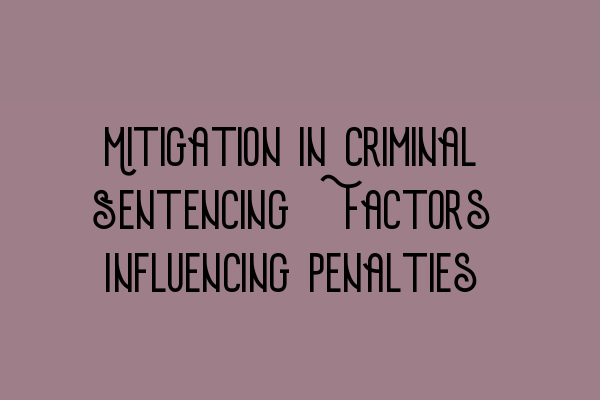Mitigation in Criminal Sentencing: Factors Influencing Penalties
When an individual is convicted of a crime, sentencing plays a crucial role in determining the consequences they will face. Mitigation is a significant aspect of criminal sentencing that considers various factors influencing the severity of penalties imposed. In this article, we will explore the key elements that can influence criminal sentencing and the importance of effective mitigation strategies.
Fairness and Justice
Before delving into the factors that impact mitigation in criminal sentencing, it is essential to understand the underlying principles of fairness and justice. Sentencing aims to strike a balance between punishment, deterrence, rehabilitation, and the overall protection of society. The court considers both aggravating and mitigating factors to ensure a fair and just outcome.
Factors Influencing Mitigation
There are various factors that can influence the mitigation process in criminal sentencing:
- Personal Circumstances: The offender’s personal circumstances, such as age, mental health, and family background, can significantly impact the sentencing decision. Individuals with favorable personal circumstances may be more likely to receive lenient penalties.
- Remorse and Rehabilitation: Expressing genuine remorse for the offense committed and demonstrating efforts towards rehabilitation can positively influence the court’s view during the sentencing process.
- Cooperation with Authorities: Offering cooperation and assistance to law enforcement agencies during the investigation and trial can be viewed as a mitigating factor and may result in reduced penalties.
- Prior Criminal Record: The presence or absence of a criminal record can greatly impact the mitigation process. First-time offenders may be more likely to receive lighter sentences compared to individuals with a history of repeat offenses.
- Role in the Offense: The level of involvement in the offense committed can also affect the sentencing decision. Lesser roles or minimal participation may lead to reduced penalties.
- Community Impact: The impact of the offense on the community and its members can influence the mitigation process. Offenders who have actively contributed positively to their community may receive more favorable sentencing outcomes.
The Role of Effective Mitigation Strategies
Implementing effective mitigation strategies is crucial in achieving the best possible outcome in criminal sentencing. Qualified solicitors specializing in criminal law can play a vital role in building and presenting a comprehensive mitigation case. They gather evidence, interview witnesses, and construct persuasive arguments to present the defendant’s mitigating factors in court.
By skillfully presenting relevant mitigating factors, solicitors can advocate for lighter penalties, such as community service, probation, or rehabilitation programs. A well-prepared mitigation case can significantly influence the final sentencing decision made by the judge.
Conclusion
Mitigation in criminal sentencing considers various factors that can influence the penalties imposed on convicted individuals. Personal circumstances, remorse, cooperation, prior criminal records, role in the offense, and community impact all play a significant role in determining the severity of sentencing. Implementing effective mitigation strategies, with the help of qualified solicitors, can greatly influence the final outcome.
For more information on preparing for SQE exams, including practice exam questions and mock tests, check out our SQE 1 Practice Exam Questions or our SQE 1 Practice Mocks FLK1 FLK2. If you are looking for preparation courses for SQE 1 or SQE 2, our SQE 2 Preparation Courses and SQE 1 Preparation Courses are designed to help you succeed. Stay updated with the latest SRA SQE exam dates by visiting our SRA SQE Exam Dates page.
